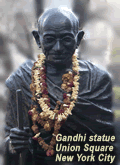Mohandas Gandhi: Enduring Icon of Leadership

Mohandas Gandhi teaches the world that there is:
[Reprinted from The Time 100: The Most Important People of the Century – http://www.time.com/time/time100/poc/magazine/
mohandas_gandhi12a.html]
In an age of empire and military might, he proved that the powerless had power and that force of arms would not forever prevail against force of spirit
By JOHANNA MCGEARY
In 1906, confronting a government move to fingerprint all Indians, Gandhi countered with a new idea — "passive resistance," securing political rights through personal suffering and the power of truth and love. "Indians," he wrote, "will stagger humanity without shedding a drop of blood." He failed to provoke legal changes, and Indians gained little more than a new found self-respect. But Gandhi understood the universal application of his crusade. Even his principal adversary, the Afrikaner leader Jan Smuts, recognized the power of his idea: "Men like him redeem us from a sense of commonplace and futility."
South Africa was dress rehearsal for Gandhi's great cause, independence for India. From the day he arrived back home at 45, he dedicated himself to "Hind swaraj," Indian self-rule. More than independence, it meant a Utopian blend of national liberty, individual self-reliance and social justice. Freedom entailed individual emancipation as well, the search for nobility of soul through self-discipline and denial. Most ordinary Indians, though, were just looking for an end to colonial rule. While his peace-and-love homilies may not have swayed them, they followed him because he made the British tremble.
"Action is my domain," he said. "It's not what I say but what I do that matters." He quickly became the commanding figure of the movement and brooked no challenge to his ultimate leadership. The force of his convictions transformed the Indian National Congress from upper-class movement to mass crusade. He made his little spinning wheel a physical bond between elite and illiterate when both donned the khadi cloth. Despite the country's proclivities for ethnic and religious strife, he inspired legions of Indians to join peaceful protests that made a mockery of empire.
In the next 33 years, he led three major crusades to undermine the power and moral defenses of the British Raj. In 1919-22 he mustered widespread nonviolent strikes, then a campaign of peaceful noncooperation, urging Indians to boycott anything British — schools, courts, goods, even the English language. He believed mass noncooperation would achieve independence within a year. Instead, it degenerated into bloody rioting, and British soldiers turned their guns on a crowd in Amritsar, massacring 400. Gandhi called his underestimating of the violence inside Indian society his "Himalayan blunder." Still, villagers mobbed him wherever he went, calling him Mahatma. By 1922, 30,000 followers had been jailed, and Gandhi ordered civil disobedience. The British slowed the momentum by jailing him for 22 months.
Gandhi was never a man to give up. On March 12, 1930, he launched his most brilliant stroke, national defiance of the law forbidding Indians to make their own salt. With 78 followers, he set out for the coast to make salt until the law was repealed. By the time he reached the sea, people all across the land had joined in. Civil disobedience spread until Gandhi was arrested again. Soon more than 60,000 Indians filled the jails, and Britain was shamed by the gentle power of the old man and his unresisting supporters. Though Gandhi had been elected to no office and represented no government, the Viceroy soon began negotiating with him.
READ MORE
| teach with movies website A FORCE MORE POWERFUL |
Click here to visit site |
| The Time 100 The Most Important People of the Century |
Click here to visit site |
Labels: Civil Rights, Faith Based, Icon of Leadership, Leadership




0 Comments:
Post a Comment
<< Home